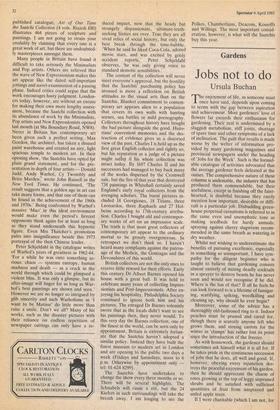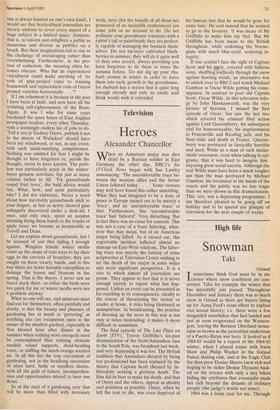Gardens
Jobs not to do
Ursula Buchan
The enjoyment of life, as someone must once have said, depends upon coming to terms with the gap between aspiration and achievement. Most gardeners' love of flowers far exceeds their enthusiasm for gardening. Their zeal is undermined by a sluggish metabolism, stiff joints, shortage of spare time and other symptoms of a lack of inclination. The guilt that results is made worse by the welter of information pro- vided by many gardening magazines and provincial newspapers under the heading of 'Jobs for the Week'. Such is the formid- able catalogue of activities advocated that the average gardener feels defeated at the outset. The comprehensive nature of these columns is undeniable, the industry that has produced them commendable, but their usefulness, except in finishing off the faint- hearted, is doubtful because they rarely mention how important, desirable or diffi- cult is a particular job. Disbudding green-, house perpetual carnations is referred to in the same even and unemphatic tone as making seedbeds for hardy annuals; spraying against cherry slugworm recom- mended in the same breath as watering in dry weather.
Whilst not wishing to underestimate the benefits of pursuing excellence, especially in something so unimportant, I have sym- pathy for the diligent beginner who is taught to believe that gardening consists almost entirely of mixing deadly cocktails in a sprayer to destroy beasts he has never seen and would not recognise. if he did. Where is the fun of that? If all he feels he can look forward to is a lifetime of fumigat- ing, scarifying, spiking, weedkilling and cleaning up, why should he ever begin?
Moreover, some of the advice has a thoroughly old-fashioned ring to it. Indoor peaches must be pruned and cared for, though there is scarcely anyone left who grows them, and storing carrots for the winter in 'clamps' has rather lost its point since the introduction of the freezer.
As with housework, the gardener should sometimes ask himself what it is all for. If he takes pride in the continuous succession of jobs that he does, all well and good. If, however, obeying every injunction des- troys the peaceful enjoyment of his garden, then he should appreciate the charm of roses growing at the top of leggy unpruned shrubs and be satisfied with sufficient quantities of fruit from unsprayed and unfed apple trees.
If I were charitable (which I am not, for one is always hardest on one's own kind), I would say that horticultural journalists are merely anxious to cover every aspect of a huge subject in a limited space. Anxious, that is, to inform and enlighten a public as numerous and diverse as pebbles on a beach. But their imaginations fail to rise to the challenge of encouraging rather than overwhelming. Furthermore, in the pro- cess of reduction, the meaning often be- comes obscure. Who but an experienced viticulturist could make anything of 'tie rods of spur-pruned vines to training framework and replacement rods of Guyot pruned varieties horizontally . . .'?
If I am vehement it is because in the past I have been at fault, and now have all the irritating self-righteousness of the Born- Again. It was I who for some years burdened the spare hours of East Anglian newspaper readers, every other Thursday, with a seemingly endless list of jobs to do. 'Tell it not in Gedney Drove, publish it not in the streets of Walsoken' should have been my watchword, or not, in any event, with such mind-numbing completeness. Nothing was omitted for fear I might be thought to have forgotten or, perish the thought, never to have known. The prob- lem was particularly acute in the winter: fewer genuine activities, but just as many column inches to fill. 'Fix greasebands round fruit trees', the bald advice would run. What, how, and most particularly why? I did not elaborate. Never a word about how inevitably greasebands stick to your fingers, as fast as newly chewed gum unhappily discovered under a desk-lid. I once, and only once, spent an autumn morning fixing these bands to the trunks of apple trees; we became as inseparable as Torvill and Dean.
Let me explain about greasebands, lest I be accused of just that failing I inveigh against. Wingless female winter moths crawl up the stems of fruit trees to lay their eggs in the crevices of branches; they are caught on these treacly bands, and in this way there are fewer harmful caterpillars to damage the leaves and blossom in the spring. That is the theory. I never saw an insect stuck there, so either the birds were too quick for me or winter moths were not a problem anyway.
What no one will say, and amateurs must find out for themselves, often painfully and slowly, is that the beauty and pleasure of gardening lies as much in 'pottering' as anything else (an occupation open to the owner of the smallest garden), especially in that blessed hour after dinner in the summer when nothing more energetic need be contemplated than training clematis tendrils round supports, dead-heading roses, or sniffing the mock-orange-scented air. In all this lies the true enjoyment of gardening, not in the headlong succession of often hard, futile or needless chores, with all the guilt of failure, incomprehen- sion and opportunities missed to bear one down.
So at the start of a gardening year that will be more than filled with necessary work, here (for the benefit of all those not possessed of an incurable restlessness) are some jobs on no account to do. Do not pollinate your greenhouse tomatoes with a rabbit's tail or paintbrush; they are perfect- ly capable of managing the business them- selves. Do not tip-layer cultivated black- berries in summer; they will do it quite well of their own accord, always providing you have forgotten to tie them to wires the autumn before. Do not dig up your rhu- barb crowns in winter in order to force them into early growth in the greenhouse, for rhubarb has a season that is quite long enough already and only an oxalic acid freak would wish it extended.











































 Previous page
Previous page